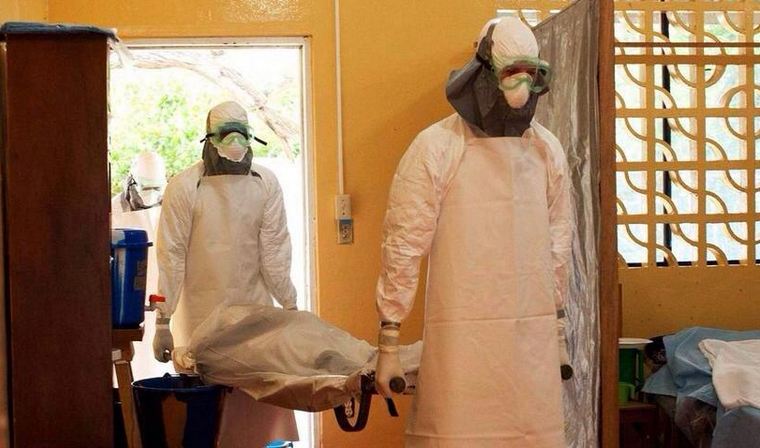
MADRID — A Spanish priest being treated for Ebola died Tuesday in Madrid despite having received an experimental drug while the World Health Organization announced it is ethical for unproven drugs and vaccines to be used amid an unprecedented outbreak in West Africa.
WHO made the pronouncement after it held a teleconference with medical experts around the world but it didn’t address who should get the limited drugs.
Two American aid workers and the Spanish priest had gotten a new Ebola drug named ZMapp, which has never been tested in humans. A U.K.-based public relations firm representing Liberia said ZMapp would be arriving within the next 48 hours to treat two Liberian physicians. They would be the first Africans known to receive the experimental drug even though the ou8tbreak has killed more than 1,000 people in Guinea, Sierra Leone, Liberia and Nigeria.
Some Guineans blamed their government for moving too slowly.
“The Liberians can count on their government, but Guineans can only count on God in the face of Ebola,” said Assiatou Diallo, a nurse in Conakry, Guinea’s capital.
But there’s not enough to go around. The San Diego-based company that makes ZMapp said Monday its supply is “exhausted.”
The U.N. health agency says 1,013 people have died so far in the Ebola outbreak in West Africa of the 1,848 suspected or confirmed cases recorded by authorities. The killer virus – spread by direct contact with bodily fluids like blood, diarrhea and vomit – was detected in Guinea in March and has hit Sierra Leone, Liberia and Nigeria.
With news of the three Westerners getting the novel drug, some in West Africa have protested that they are being denied a chance to try it.
“We can’t afford to be passive while many more die,” said Aisha Dab, a Senegalese-Gambian journalist who was tweeting using the hashtag “GiveUsTheSerum.”
Officials in Sierra Leone and Guinea expressed interest in getting experimental treatments but haven’t yet asked.
The Spanish missionary, 75-year-old Miguel Pajares, died in Madrid’s Carlos III Hospital, the hospital and his order said. A doctor who was part of the team treating the priest confirmed that he received the experimental drug. The doctor, an infectious diseases specialist, spoke on condition of anonymity, not being authorized to discuss the treatment.
Pajares’ body will be cremated Wednesday to avoid any further public health risks, the hospital said. He had worked for the San Juan de Dios hospital order, a Catholic group, helping to treat people with Ebola in Liberia when he became ill and was evacuated.
WHO said the size of the outbreak – the biggest-ever in history and the first in West Africa – made the experimental use of drugs ethical even though there is no evidence that they can actually help fight Ebola and it is possible they could be harmful or have no effect at all.
Dr. Marie-Paule Kieny, an assistant director-general at WHO, told a press conference Tuesday: “We don’t have enough people to rely on the traditional methods if we want to stop the outbreak as soon as possible.”
WHO said it was OK to use unproven treatments if patients are allowed to have informed consent, confidentiality and freedom of choice.
The panel urged a “more detailed analysis and discussion” to decide who should have access to the extremely limited supply of experimental treatments.
“I don’t think there could be any fair distribution of something available in such small quantities,” Kieny noted.
She said some companies were speeding up trials of their new Ebola vaccines and there might be some preliminary safety data by the end of the year.
WHO also said the world had “a moral duty” to collect evidence about the safety and effectiveness of Ebola treatments in proper scientific trials.
Canada’s Tekmira Pharmaceuticals Corp. is developing a drug that targets Ebola’s genetic material. The Food and Drug Administration, a U.S. regulator, had halted a small safety study with questions about a reaction in healthy volunteers. Last week, Tekmira announced that the FDA had modified its restriction, clearing a roadblock to possible experimental use in infected patients, and said it was “carefully evaluating options.”
West African nations are struggling to control both the deadly outbreak and the fear it has created. Some airlines flying in and out of the region have suspended flights.
The Ivory Coast, which shares borders with Liberia and Guinea, banned direct flights from those countries and said it would increase health inspections at its borders.
On Tuesday, Liberian President Ellen Johnson Sirleaf suspended all travel by executive branch officials for one month. She also ordered those already abroad to return home within a week “or be considered as abandoning their jobs,” according to a statement.
Cheng reported from London. Jonathan Paye-Layleh in Monrovia, Liberia; Clarence Roy-Macaulay in Freetown, Sierra Leone; Jorge Sainz in Madrid and Boubacar Diallo in Conakry, Guinea, contributed to this report.